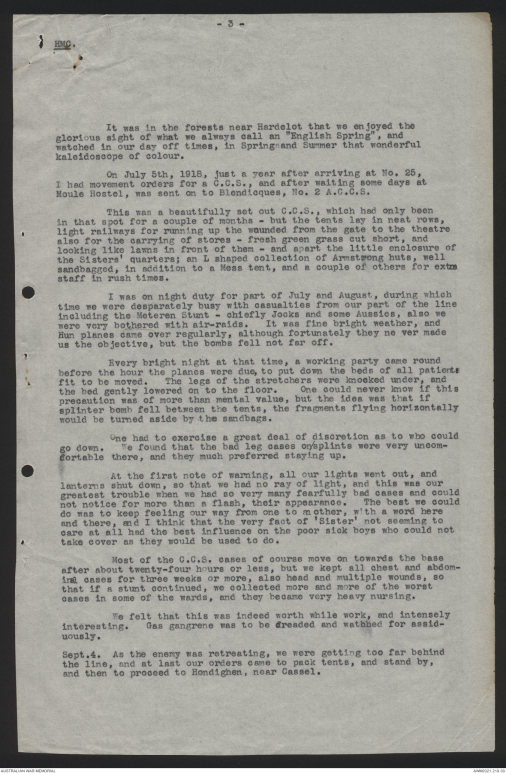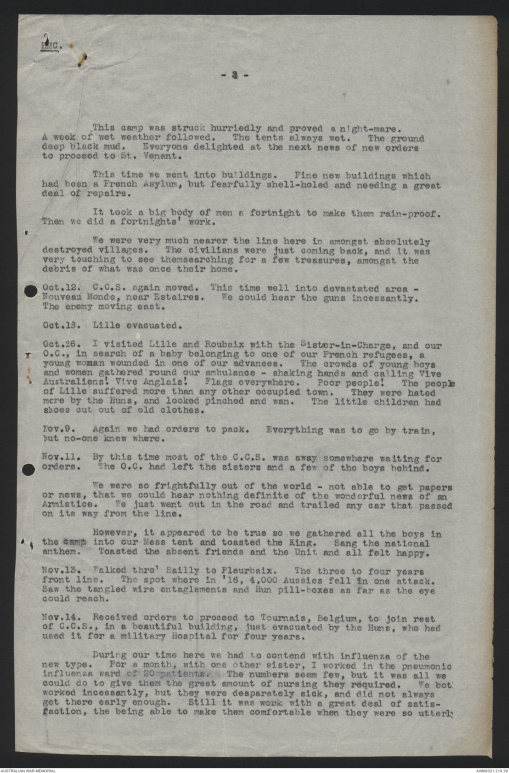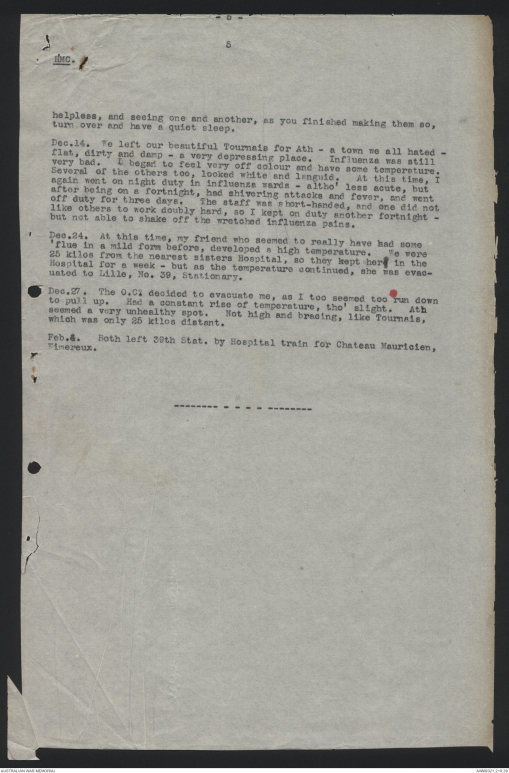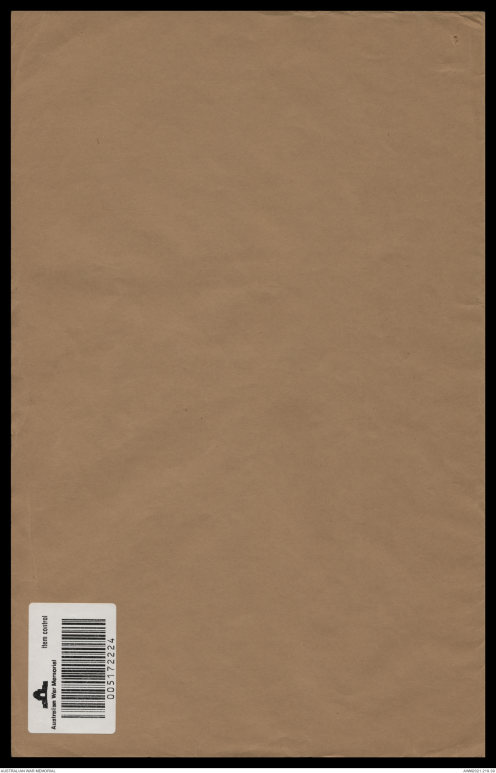AWM41 979 - [Nurses Narratives] Sister M E Hall - Part 2




- 3 -
HMC.
It was in the forests near Hardelot that we enjoyed the
glorious sight of what we always call an "English Spring" , and
watched in our day off times, in Spring and Summer that wonderful
kaleidoscope of colour.
On July 5th, 1918, just a year after arriving at No. 25,
I had movement orders for a C.C.S., and after waiting some days at
Moule Hostel, was sent on to Blendicques, No. 2 A.C.C.S.
This was a beautifully set out C.C.S., which had only been
in that spot for a couple of months - but the tents lay in neat rows,
light railways for running up the wounded from the gate to the theatre
also for the carrying of stores - fresh green grass cut short, and
looking like lawns in front of them - and apart the little enclosure of
the Sisters' quarters; an L shaped collection of Armstrong huts, well
sandbagged, in addition to a Mess tent, and a couple of others for extra
staff in rush times.
I was on night duty for part of July and August , during which
time we were desparately busy with casualties from our part of the line
including the Meteren Stunt - chiefly Jocks and some Aussies, also we
were very bothered with air-raids. It was fine bright weather, and
Hun planes came over regularly, although fortunately they never made
us the objective, but the bombs fell not far off.
Every bright night at that time, a working party came round
before the hour the planes were due, to put down the beds of all patients
fit to be moved. The legs of the stretchers were knocked under, and
the bed gently lowered on to the floor. One could never know if this
precaution was of more than mental value, but the idea was that if
splinter bomb fell between the tents, the fragments flying horizontally
would be turned aside by the sandbags.
One had to exercise a great deal of discretion as to who could
go down. We found that the bad leg cases on/splints were very uncomfortable
there, and they much preferred staying up.
At the first note of warning, all our lights went out, and
lanterns shut down, so that we had no ray of light, and this was our
greatest trouble when we had so very many fearfully bad cases and could
not notice for more than a flash, their appearance. The best we could
do was to keep feeling our way from one to another, with a word here
and there, and I think that the very fact of ‘Sister' not seeming to
care at all had the best influence on the poor sick boys who could not
take cover as they would be used to do.
Most of the C.C.S. cases of course move on towards the base
after about twenty-four hours or less, but we kept all chest and abdominal
cases for three weeks or more, also head and multiple wounds, so
that if a stunt continued, we collected more and more of the worst
cases in some of the wards, and they became very heavy nursing.
We felt that this was indeed worth while work, and intensely
interesting. Gas gangrene was to be dreaded and watched for assiduously.
Sept.4. As the enemy was retreating, we were getting too far behind
the line, and at last our orders came to pack tents, and stand by,
and then to proceed to Hondighen, near Cassel.
HMC.
- 4 -
This camp was struck hurriedly and proved a night-mare.
A week of wet weather followed. The tents always wet. The ground
deep black mud. Everyone delighted at the next news of new orders
to proceed to St. Venant.
This time we went into buildings. Fine new buildings which
had been a French Asylum, but fearfully shell-holed and needing a great
deal of repairs.
It took a big body of men a fortnight to make them rain-proof.
Then we did a fortnights’ work.
We were very much nearer the line here in amongst absolutely
destroyed villages. The civilians were just coming back, and it was
very touching to see them searching for a few treasures, amongst the
debris of what was once their home.
Oct. 12. C.C.S. again moved. This time well into devastated area -
Nouveau Monde, near Estaires. We could hear the guns incessantly.
The enemy moving east.
Oct.13. Lille evacuated.
Oct.26. I visited Lille and Roubaix with the Sister-in-Charge, and our
O.C., in search of a baby belonging to one of our French refugees, a
young woman wounded in one of our advances. The crowds of young boys
and women gathered round our ambulance - shaking hands and calling Vive
Australiens! Vive Anglais! Flags everywhere. Poor people! The people
of Lille suffered more than any other occupied town. They were hated
more by the Huns, and looked pinched and wan. The little children had
shoes cut out of old clothes.
Nov.9. Again we had orders to pack. Everything was to go by train,
but no-one knew where.
Nov.11. By this time most of the C.C.S. was away somewhere waiting for
orders. The O.C. had left the sisters and a few of the boys behind.
We were so frightfully out of the world - not able to get papers
or news, that we could hear nothing definite of the wonderful news of an
Armistice. We just went out in the road and trailed any car that passed
on its way from the line.
However, it appeared to be true so we gathered all the boys in
the camp into our Mess tent and toasted the King. Sang the national
anthem. Toasted the absent friends and the Unit and all felt happy.
Nov.13. Walked thro’ Sailly to Fleurbaix. The three to four years
front line. The spot where in ’16, 4,000 Aussies fell in one attack.
Saw the tangled wire entanglements and Hun pill-boxes as far as the eye
could reach.
Nov.14. Received orders to proceed to Tournais, Belgium, to join rest
of C.C.S., in a beautiful building, just evacuated by the Huns, who had
used it for a military Hospital for four years.
During our time here we had to contend with influenza of the
new type. For a month, with one other sister, I worked In the pneumonic
influenza ward of 20 patients. The numbers seem few, but it was all we
could do to give them the great amount of nursing they required. We both
worked incessantly, but they were desparately sick, and did not always
get there early enough. Still it was work with a great deal of satisfaction,
the being able to make them comfortable when they were so utterly
- 5 -
5
HMC.
helpless, and seeing one and another, as you finished making them so,
turn over and have a quiet sleep.
Dec.14. We left our beautiful Tournais for Ath - a town we all hated -
flat, dirty and damp – a very depressing place. Influenza was still
very bad. I began to feel very off colour and have some temperature.
Several of the others too, looked white and languid. At this time, I
again went on night duty in influenza wards – altho’ less acute, but
after being on a fortnight, had shivering attacks and fever, and went
off duty for three days. The staff was short-handed, and one did not
like others to work doubly hard, so I kept on duty another fortnight -
but not able to shake off the wretched influenza pains.
Dec.24. At this time, my friend who seemed to really have had some
‘flue in a mild form before, developed a high temperature. We were
25 kilos from the nearest sisters Hospital, so they kept herx in the
Hospital for a week - but as the temperature continued, she was evacuated
to Lille, No. 39, Stationary.
Dec.27. The O.C. decided to evacuate me, as I too seemed too run down
to pull up. Had a constant rise of temperature, tho’ slight. Ath
seemed a very unhealthy spot. Not high and bracing, like Tournais,
which was only 25 kilos distant.
Feb.4. Both left 39th Stat. by Hospital train for Chateau Mauricien,
Wimereux.
Item Control
Australian War Memorial
005172224
 Not Yet Replaced By AI
Not Yet Replaced By AIThis transcription item is now locked to you for editing. To release the lock either Save your changes or Cancel.
This lock will be automatically released after 60 minutes of inactivity.